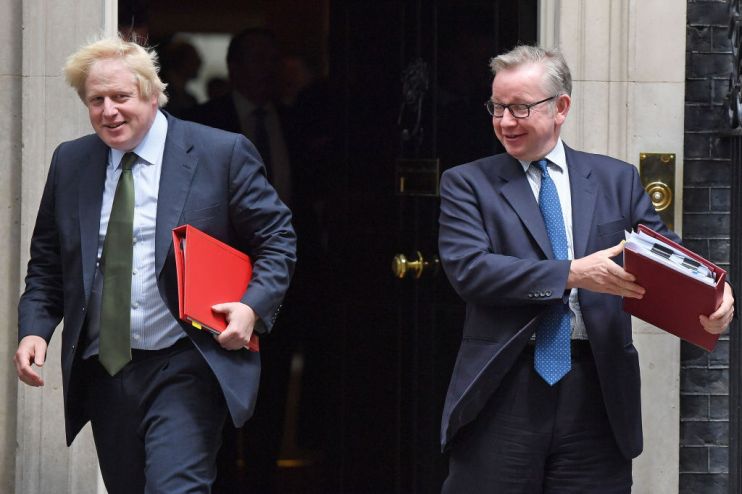Friends, then rivals: Boris Johnson has the last laugh over Michael Gove - City AM (original) (raw)
Thursday 20 June 2019 6:34 pm

LONDON, ENGLAND – JUNE 15: Foreign Secretary Boris Johnson and Environment Secretary Michael Gove leave 10 Downing Street on June 15, 2017 in London, England. Prime Minister Theresa May is due to hold a series of meetings with the main Northern Ireland political parties today to allay mounting concerns over a government deal with the DUP in the wake of the UK general election. (Photo by Chris J Ratcliffe/Getty Images)
First they were friends, then they were rivals, and now, Johnson is the victor.
The lives of Boris Johnson and Michael Gove ran parallel for many years, before becoming intertwined during the EU referendum and split apart by an act of betrayal in the 2016 leadership contest.
Johnson has now got his revenge for Gove knifing him so brutally three years ago, when his fellow Brexit campaign withdrew support for his leadership campaign on the morning of his launch.
It is now Johnson who looks set to be the next Prime Minister, while Gove has – just like in 2016 – finished third in a leadership battle.
Johnson and Gove’s relationship goes back more than 30 years, first meeting at Oxford University in 1985.
Gove spotted Johnson in a student bar and, seduced by his personality, helping him become elected as president of the Oxford Union debating society.
Johnson landed a job at The Times after graduating (from which he was sacked for making up quotes and almost instantly hired by the Telegraph), while Gove returned to his home town to learn his craft as a trainee on the Aberdeen Press and Journal.
Even when Gove eventually broke through into the national media, first for the BBC and then The Times, Johnson was making waves in Brussels working for the Telegraph.
Despite the pairs’ careers path following similar trajectories – Oxford; journalism; parliament – Johnson was always a few steps ahead.
While Gove was working away at the Times in the late 90s, Johnson was appointed editor of the Spectator magazine. Johnson beat Gove into parliament by getting elected in 2001 – four years before Gove – and then became the most powerful Conservative in the country by winning the London Mayoralty in 2008.
Even when Gove did achieve high office as Education Secretary from 2010 to 2014, Johnson was the politician with star power, while Gove was deemed “toxic” by teachers and parents alike.
The 2016 EU referendum changed everything. Gove came into his own in television debates on Sky and the BBC, winning applause from audiences for his attention to detail and passionate belief in Brexit.
Johnson may have still been the more able frontman, but in the post-referendum melee as the Tories searched for a new leader, Gove realised the former London Mayor did not have the discipline or focus to be Prime Minister.
Three years on, and the two faced-off again. Johnson’s tenure as foreign secretary did nothing to repudiate the accusation he is a sloppy politician who, while adept at knocking out an entertaining newspaper column, is averse to knuckling down to serious matters.
Gove sought to shed the accusation of disloyalty by being one of the most vociferous defenders of Theresa May’s Brexit deal. Ironically, it may well have been that loyalty that stopped him becoming Prime Minister, with some Tory MPs refusing to back him as they questioned his Brexit credentials.
Ultimately, Johnson has had the last laugh, with Gove unable to make it to the final two in the race. With Johnson’s support only increasing by three votes between the fourth and fifth ballots, some will wonder if his supporters switched to Jeremy Hunt to ensure Gove was knocked out.
Regardless of how it happened, Gove’s dreams of becoming Prime Minister are over – most likely for good.
Barring a major upset by Hunt, it is now down to the mercy of Johnson as to whether Gove remains in the Cabinet.
Gove will soon discover just how deeply Johnson will stick the knife.